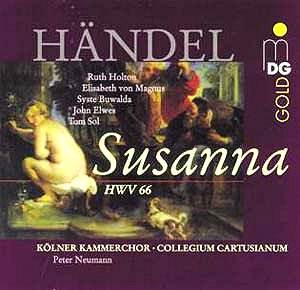Handel composed Susanna in six weeks of July
and August, 1748, shortly after finishing Solomon. Although it
was well received, it was only performed four times during his
life.
The oratorio tells the story of the unjust accusation
of Susanna by two elders who lusted after her. Susanna, a respectable
married woman, refused their requests for sex after they spied
on her bathing in her garden. To get even with her, the elders
accused her of sleeping with a young man they claimed to have
seen with Susanna in her garden. She was found guilty and condemned
to death by stoning. However, Daniel had the case reopened and
got the false witnesses to contradict each other. They each claimed
that the adultery took place under a different kind of tree. The
elders were put to death instead.
The very first notes, and the entire overture
and first chorus of this oratorio, have an ominous, portentous
sound, in some ways similar to the opening chorus of Bach's St.
Matthew Passion. But the tone changes, becoming lighter and more
optimistic with the first aria, in spite of its dark title Clouds
o'ertake the brightest day. These first few minutes set the tone
of this work - it is one of contrasts, of dark and light, of guilt
and innocence.
Musically, Peter Neumann maintains perfect tension
throughout the performance. From the urgency of the aria Who fears
the lord, to the lightness of the recitatives, the orchestra's
sound always serves the music flawlessly.
The soloists are also excellent; baritone Tom
Sol shines in the aria Who fears the lord. Alto Sytse Buwalda
has a fine voice, but his diction is not always clear enough.
Soprano Ruth Bolton is brilliant, with a fine range of emotion
and a stunning voice. She is clearly the star of this work, with
many long arias, and her singing is unforgettable; one especially
remarkable aria is Bending to the throne of glory, in the first
act, which is a tense and emotional piece, another is Chrystal
streams in murmurs flowing, in the second act, a delightful pastoral
song, which she performs admirably.
The choir is excellent, but, unfortunately, only
has a handful of chances to show its talent. The final movement
of the first act is a brilliant piece with the different sections
of the choir singing a sort of round; their voices ring out clearly,
and the overall texture is magnificent.
The sound of this recording is remarkable - from
the lush, rich sounds of the choir, to the tender, subtle nuances
of the duets, the myriad details of the music come through perfectly.
In spite of this being a live recording, the voices and instruments
are very well balanced - there are naturally some weak spots,
as in most live recordings, but the overall atmosphere captured
on this magical evening in February 1999 is brilliant.
This is an excellent recording - the soloists,
the choir, the orchestra and the sound are all top-notch. In addition,
the vitality of the live performance comes across well. This is
a must-have recording for fans of Handel's vocal music; a necessary
discovery for others.
Kirk McElhearn

